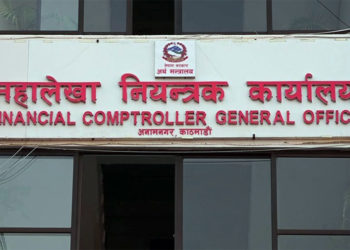KATHMANDU: Economic Digest offers a concise yet comprehensive overview of significant business happenings in Nepal, presented in easily digestible summaries.
The latest trading session on the NEPSE index has brought a modest yet encouraging uplift, closing at 2,645.36 points after gaining 27.41 points, indicating a resilient market recovery following previous declines.
This positive shift coincides with a broader market landscape where fluctuations in asset prices, such as a slight dip in gold, illustrate the ongoing volatility in investment sectors.
The mixed results in the life and non-life insurance markets highlight the competitive nature of the industry, with varying success in premium collections among different companies.
Additionally, the agricultural sector shows promise with the anticipated export of 200,000 garlands of makhamali flowers for the Tihar festival, fueled by growing demand from Nepali communities abroad.
Meanwhile, the rise in black cardamom prices signals a rebound for farmers after years of decline, although concerns remain about production levels due to aging plants.
The upcoming regular flights at Tikapur Airport mark a significant development for regional connectivity, further emphasizing the dynamic changes across various sectors in Nepal’s economy.
NEPSE Index up by 27.41 points to settle at 2,645.36
The NEPSE index wrapped up Monday’s trading session at 2,645.36 points, gaining 27.41 points (1.04%) compared to the previous close. This comes after a notable decline of 9.19 points in the last session.
Starting at 2,620.91, the index experienced some volatility, reaching a high of 2,647.23 before dropping to an intraday low of 2,620.66 points.
During Monday’s trading, 307 stocks were involved in 58,552 transactions, with a total of 10,418,926 shares traded, resulting in a turnover of Rs. 5.34 billion.
The market capitalization was recorded at Rs. 4.20 trillion, while the float market capitalization was Rs. 1.48 trillion.
Gold drops Rs. 400 from record high
The gold market on Monday experienced a minor correction, with prices decreasing by Rs. 400 per tola.
According to the Federation of Nepal Gold and Silver Dealers’ Association, fine gold was priced at Rs. 167,000 per tola, down from Rs. 167,400 per tola.
Tejabi gold also saw a decline, now valued at Rs. 166,300 per tola, a reduction of Rs. 400 from the previous day’s rate of Rs. 166,700 per tola.
This price drop follows a recent peak on October 27, 2024, when fine gold reached an all-time high of Rs. 167,400 per tola.
In addition, silver prices also decreased by Rs. 20 per tola, listed at Rs. 2,065 per tola, compared to Rs. 2,085 per tola the previous day.
Life and non-life insurance sectors show mixed results
Insurance firms are vying to boost their premium collections.
By the end of Aswin in the fiscal year 2081/82, life insurance companies amassed a total premium of Rs 41.08 billion, covering 13,335,998 active insurance policies.
According to the Nepal Insurance Authority, Nepal Life Insurance Company Limited alone collected Rs 11.99 billion, with 1,644,219 active insurance policies as of Aswin 2081.
In contrast, Reliable Nepal Life Insurance Co. Ltd. revealed a notable finding: despite having the highest number of active insurance policies at 2,514,187, the company managed to generate only Rs 1.2 billionin premiums during the same period.
Nepal set to export 200,000 garlands of Makhamali flowers
Nepal is preparing to export approximately 200,000 garlands of makhamali flowers for the Tihar festival this year.
The Floriculture Association of Nepal reported that last year, 150,000 garlands were exported.
According to Association Chairperson Dilip Bade, there is a growing demand for makhamali flower garlands, particularly in the US, Japan, Australia, Korea, and several European countries, as well as in the Gulf region.
The rising demand for these garlands is attributed to the increasing number of Nepalis living abroad.
Black cardamom prices rise
The price of black cardamom in Sankhuwasabha has increased to Rs 90,000 per mann (40 kg) this year, marking the end of a decade-long decline.
Ten years ago, the price was around Rs 120,000 but dropped to Rs 25,000 before recovering due to rising international demand. Last year, prices ranged from Rs 60,000 to Rs 65,000 per mann.
A decrease in production, attributed to aging plants, is also driving prices higher. Black cardamom is an important cash crop for farmers in the region, with 98% of the yield exported, primarily to India.
The crop is grown on 2,871 hectares in the district, with last year’s production at 940 metric tons expected to decline further this year.
Tikapur Airport to begin Regular flights after festivals
Test flights took place at Tikapur Airport on Monday, featuring aircraft from Nepal Airlines and Tara Air.
Minister of State for Culture, Tourism, and Civil Aviation, Arun Kumar Chaudhary, announced that regular flights will start immediately after the Tihar festival, including routes to hilly areas in Sudurpaschim Province.
Tikapur Airport began operations in 2041 BS and had regular flights for its first three years. A total of twelve individuals, including various officials and crew members, participated in the test flights.
(Prepared by Srija Khanal)









Comment